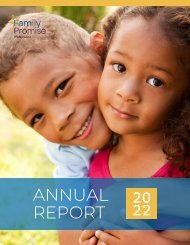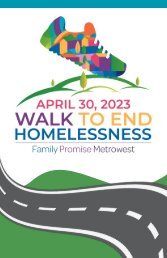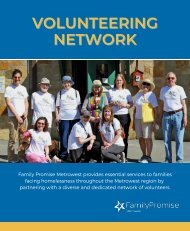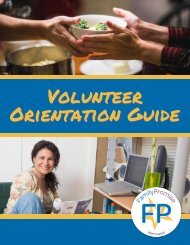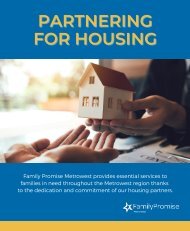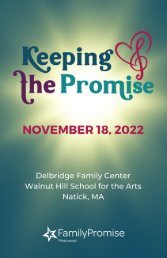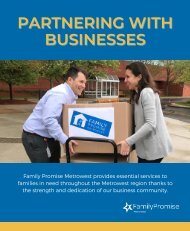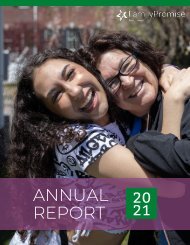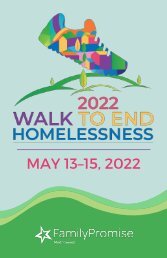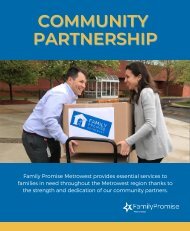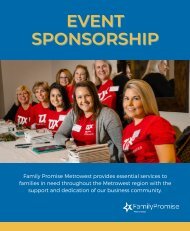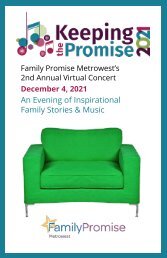FPM Volunteer Orientation Guide
This guide orients new volunteers to Family Promise Metrowest's history, programs, and volunteer roles.
This guide orients new volunteers to Family Promise Metrowest's history, programs, and volunteer roles.
You also want an ePaper? Increase the reach of your titles
YUMPU automatically turns print PDFs into web optimized ePapers that Google loves.
<strong>Volunteer</strong><br />
<strong>Orientation</strong><br />
<strong>Guide</strong>
CONTENTS<br />
Introduction<br />
About <strong>FPM</strong><br />
Family Homelessness in MA<br />
Our Families<br />
Our Programs<br />
Empathy<br />
Non-Discrimination<br />
Boundaries & Expectations<br />
Children in Shelter<br />
<strong>Volunteer</strong> Opportunities<br />
<strong>Volunteer</strong>ing with Children<br />
Reminders & Contact Info<br />
Assessment & Final Steps<br />
2
Introduction<br />
Welcome to<br />
Family Promise Metrowest!<br />
<strong>Volunteer</strong>ing with <strong>FPM</strong> is a hands-on<br />
opportunity to welcome our families into<br />
a safe and caring community.<br />
3
Introduction<br />
<strong>Volunteer</strong> orientation is<br />
divided into two parts:<br />
1. This self-paced <strong>Volunteer</strong> <strong>Orientation</strong><br />
<strong>Guide</strong> will take about an hour to<br />
complete. In addition to reading the<br />
text, please be sure to<br />
watch the videos and<br />
follow links to our<br />
website for more<br />
information.<br />
2. A live session will be<br />
conducted via video<br />
conference or in person,<br />
and will also take about an<br />
hour. You will be sent an<br />
email to sign up for the live<br />
session after you complete<br />
this orientation.<br />
4
Introduction<br />
To be qualified to volunteer directly with our<br />
families, you’ll need to:<br />
Register on CERVIS (for ages 14+)<br />
Complete this virtual orientation<br />
Take an online assessment<br />
Participate in a live training session<br />
5 5
CONTENTS<br />
Introduction<br />
About <strong>FPM</strong><br />
Family Homelessness in MA<br />
Our Families<br />
Our Programs<br />
Empathy<br />
Non-Discrimination<br />
Boundaries & Expectations<br />
Children in Shelter<br />
<strong>Volunteer</strong> Opportunities<br />
<strong>Volunteer</strong>ing with Children<br />
Reminders & Contact Info<br />
Assessment & Final Steps<br />
6
About <strong>FPM</strong><br />
Our Mission<br />
To transform the lives of families with<br />
children that are facing homelessness by<br />
mobilizing a diverse community to<br />
provide shelter, education, and<br />
comprehensive support.<br />
7
About <strong>FPM</strong><br />
Our mission is supported by<br />
these core values:<br />
Partnership: We work together as a<br />
community to forge lasting solutions to<br />
the adversities our families face.<br />
Empathy: We approach our families with<br />
compassion and seek to understand and<br />
learn from each other.<br />
Equity: We believe in fairness and accept<br />
our responsibility to remedy injustices in<br />
our communities.<br />
Sustainability: We support our families in<br />
working toward a future of stability and<br />
independence.<br />
Stewardship: We strive to be good<br />
stewards of our resources in order to build<br />
a strong, healthy, and lasting organization.<br />
8
About <strong>FPM</strong><br />
<strong>FPM</strong> is a 501(c)3 nonprofit organization<br />
founded in 2008 by a network of multi-faith<br />
congregations that wanted to work together<br />
to address an alarming rise in family<br />
homelessness in the greater Boston region.<br />
9
About <strong>FPM</strong><br />
We are an “Affiliate” of the national Family<br />
Promise organization founded by Karen<br />
Olson in Summit, NJ in 1988.<br />
Learn more about<br />
Family Promise<br />
National<br />
We are one of more than 200 Affiliates<br />
across the United States that are<br />
providing a holistic solution to family<br />
homelessness.<br />
10
About <strong>FPM</strong><br />
There are two other Family Promise<br />
Affiliates in Massachusetts:<br />
Interfaith Hospitality Network<br />
of Greater Worcester and<br />
Family Promise North Shore Boston<br />
in Beverly.<br />
Interfaith Hospitality<br />
Network of<br />
Greater Worcester<br />
Family Promise<br />
North Shore Boston<br />
that's us!<br />
11
About <strong>FPM</strong><br />
Our network of 50 congregations from across the<br />
Metrowest region provides essential support for our<br />
Shelter program, including preparing or purchasing<br />
food for families in shelter and fulfilling critical<br />
volunteer roles.<br />
To see the entire list of congregations:<br />
Congregational<br />
Network<br />
12
About <strong>FPM</strong><br />
<strong>FPM</strong> relies on a broad network of donors to support<br />
our programs. These include foundations,<br />
businesses, and local civic groups.<br />
To learn more about our Community Partners:<br />
Foundations Businesses Groups<br />
13
About <strong>FPM</strong><br />
We also receive support and supply donations from<br />
individuals, families, and local schools.<br />
Finally, we host two major fundraisers each year, a<br />
walkathon in the spring and a gala in the fall.<br />
To learn more about the different ways people give:<br />
Ways to Donate<br />
14
About <strong>FPM</strong><br />
For information about how we serve<br />
families, watch “A Home to Call My Own.”<br />
15
CONTENTS<br />
Introduction<br />
About <strong>FPM</strong><br />
Family Homelessness in MA<br />
Our Families<br />
Our Programs<br />
Empathy<br />
Non-Discrimination<br />
Boundaries & Expectations<br />
Children in Shelter<br />
<strong>Volunteer</strong> Opportunities<br />
<strong>Volunteer</strong>ing with Children<br />
Reminders & Contact Info<br />
Assessment & Final Steps<br />
16
Family Homelessness in MA<br />
“Homeless”<br />
is not a type of person.<br />
It is simply a word that describes a person’s<br />
temporary housing state, which can be the<br />
result of many circumstances. <strong>FPM</strong> helps<br />
“families experiencing homelessness,” not<br />
“homeless families.”<br />
17
Family Homelessness in MA<br />
The most common root causes of family<br />
homelessness in the metrowest Boston<br />
region are a lack of affordable housing<br />
combined with low earnings.<br />
Did you know that 47% of Americans can’t<br />
cover an unexpected $400 bill without<br />
selling something or borrowing money?<br />
18
Family Homelessness in MA<br />
Other circumstances that may result in a family<br />
losing their home include:<br />
Job loss or reduction in hours<br />
Vehicle breakdown<br />
Medical bills<br />
Childcare closure<br />
Families face many challenges when<br />
applying for state shelter.<br />
And due to overwhelming demand, it<br />
has become even harder to get help.<br />
We are an alternative when state shelter<br />
or government-supported housing is not<br />
an option.<br />
19
CONTENTS<br />
Introduction<br />
About <strong>FPM</strong><br />
Family Homelessness in MA<br />
Our Families<br />
Our Programs<br />
Empathy<br />
Non-Discrimination<br />
Boundaries & Expectations<br />
Children in Shelter<br />
<strong>Volunteer</strong> Opportunities<br />
<strong>Volunteer</strong>ing with Children<br />
Reminders & Contact Info<br />
Assessment & Final Steps<br />
20
Our Families<br />
We serve families with children that are:<br />
Low- and moderate-income<br />
Experiencing homelessness or at risk<br />
of homelessness<br />
Motivated to make changes that will<br />
move them out of poverty and into a<br />
sustainable future<br />
21
Our Families<br />
Our families are motivated and hardworking.<br />
When entering our programs the majority of<br />
our parents are:<br />
High school graduates<br />
Employed<br />
Earning $15-20/hour<br />
But even so...<br />
22
Our Families<br />
...a single parent earning minimum<br />
wage would have to work<br />
three to four full-time jobs<br />
to afford a modest two-bedroom<br />
apartment in the Boston area.<br />
Affording this rent is simply<br />
impossible without assistance.<br />
23
Our Families<br />
These statistics will help you learn about the<br />
state of family homelessness in Massachusetts<br />
and the circumstances our families face:<br />
UNDERSTANDING<br />
FAMILY<br />
HOMELESSNESS<br />
24
Family Homelessness in MA<br />
Watch “Who Are You Preparing<br />
to Welcome?”<br />
25
CONTENTS<br />
Introduction<br />
About <strong>FPM</strong><br />
Family Homelessness in MA<br />
Our Families<br />
Our Programs<br />
Empathy<br />
Non-Discrimination<br />
Boundaries & Expectations<br />
Children in Shelter<br />
<strong>Volunteer</strong> Opportunities<br />
<strong>Volunteer</strong>ing with Children<br />
Reminders & Contact Info<br />
Assessment & Final Steps<br />
26
Our Programs<br />
<strong>FPM</strong> is proud of our unique, family-focused<br />
approach. To develop our programming, we:<br />
Listen to our families<br />
Understand their individual needs<br />
Respond efficiently and effectively<br />
27
Our Programs<br />
Our four programs were all developed in<br />
response to the emerging needs of<br />
families in our region:<br />
Shelter<br />
SAIL<br />
LIFE<br />
Steps to Success<br />
28
Our Programs<br />
The Shelter Program<br />
At the heart of <strong>FPM</strong> is a network of 50 multi-faith<br />
congregations. Traditionally, “host” congregations<br />
provided temporary overnight shelter for families by<br />
converting their classrooms into bedrooms 3-4 weeks<br />
a year, while “support” congregations offer additional<br />
volunteers and resources. Due to COVID, however, our<br />
shelter families have been housed in a hotel since<br />
March 2020 and we are currently working to<br />
determine our future model for shelter housing.<br />
Our Day Center in Natick is the families’ home base<br />
while in shelter—where they keep their belongings<br />
and meet with their case manager, who supports<br />
them in establishing and reaching important goals.<br />
29
Our Programs<br />
The shelter model uses<br />
existing community resources:<br />
Multi-faith congregations to provide<br />
shelter resources and support<br />
<strong>Volunteer</strong>s to provide meals and<br />
fulfill important shelter roles<br />
Community agencies for additional<br />
resources and referrals<br />
30
Our Programs<br />
Our shelter model is:<br />
Cost-effective<br />
Community-driven<br />
For more information,<br />
please visit our website.<br />
SHELTER<br />
PROGRAM<br />
31
Our Programs<br />
The SAIL Program<br />
When families move out of shelter and back into<br />
apartments in the community, they enter our SAIL<br />
program (Sustaining Achievements for Independent<br />
Living). In this program, we help them reestablish<br />
their independence and lay the groundwork for longterm<br />
stability by providing:<br />
Financial support (“subsidies”) toward housing<br />
costs for one year<br />
Help in accessing furniture and household goods<br />
donations<br />
One to two years of ongoing case management<br />
to monitor their budget and ensure continual<br />
progress toward their goals<br />
For more information,<br />
please visit our website.<br />
SAIL<br />
PROGRAM<br />
32
Our Programs<br />
The LIFE Program<br />
The LIFE program (Local Initiative for Family<br />
Empowerment) is a homelessness prevention and<br />
shelter diversion program that supports families<br />
who are not yet homeless but at risk of eviction or<br />
shelter entry. This is our biggest program in terms of<br />
number of families served. LIFE families receive:<br />
Funding to pay for back rent, a security deposit,<br />
or other temporary housing costs<br />
Up to one year of case management<br />
Monthly group meetings to build community<br />
and increase access to resources<br />
The LIFE program enables families to avoid the<br />
trauma of losing their home and/or entering shelter.<br />
For more information,<br />
please visit our website.<br />
LIFE<br />
PROGRAM<br />
33
Our Programs<br />
The Steps to Success Program<br />
The Steps to Success program helps parents and<br />
teenage children in any of our housing programs find<br />
employment and educational opportunities that will<br />
increase their earning potential and help break the<br />
cycle of poverty. Through this program, families can<br />
access:<br />
Trained volunteers to provide professional support<br />
Referrals to community partners that offer<br />
educational or employment resources<br />
Subsidies for tuition, course fees, or supplies<br />
Subsidies for employment- or education-related<br />
childcare or transportation<br />
For more information,<br />
please visit our website.<br />
STEPS TO SUCCESS<br />
PROGRAM<br />
34
Our Programs<br />
What Is Case Management?<br />
Case management meetings give families an<br />
opportunity to meet weekly (shelter) or monthly (SAIL or<br />
LIFE) with program staff to discuss the particular<br />
challenges they are facing, set goals to tackle those<br />
obstacles, find the resources to meet their goals, and<br />
track their progress in achieving them. Goals are set in<br />
areas that are critical to their future sustainability<br />
including: Finances, Healthcare, Employment, Parenting,<br />
Transportation, and Housing.<br />
Case management provides a supportive structure<br />
for families to create their own change. It is a critical<br />
aspect of our approach to helping families achieve<br />
long-term success.<br />
35
Our Programs<br />
Our Impact<br />
Since our founding in 2008, we have provided<br />
shelter and support for close to 300 families,<br />
including almost 350 adults and 500 children. For<br />
an overview of the outcomes we achieved in our<br />
programs last year, please visit the “Our Impact”<br />
page on our website or read our most recent<br />
Annual Report.<br />
OUR<br />
IMPACT<br />
ANNUAL<br />
REPORTS<br />
36
Our Programs<br />
Watch “Nicole’s Story” to understand<br />
the impact of our programs on the<br />
families we serve.<br />
37
CONTENTS<br />
Introduction<br />
About <strong>FPM</strong><br />
Family Homelessness in MA<br />
Our Families<br />
Our Programs<br />
Empathy<br />
Non-Discrimination<br />
Boundaries & Expectations<br />
Children in Shelter<br />
<strong>Volunteer</strong> Opportunities<br />
<strong>Volunteer</strong>ing with Children<br />
Reminders & Contact Info<br />
Assessment & Final Steps<br />
38
Empathy<br />
Try to imagine if...<br />
...you had no place to go<br />
at the end of a long day.<br />
...you had no place to<br />
invite friends to gather.<br />
...you had no place to seek<br />
refuge during a storm, or a<br />
pandemic.<br />
39
Empathy<br />
Although our families are motivated and resilient,<br />
many of them have difficult and complicated<br />
histories. Losing a home only amplifies these<br />
challenges and can make them feel:<br />
Overwhelmed<br />
Depressed<br />
Sad<br />
Anxious<br />
40
Empathy<br />
The stress of a housing crisis can also affect an<br />
individual’s behavior. On the outside it might<br />
look like:<br />
Detachment<br />
Exhaustion<br />
Indifference<br />
Ungratefulness<br />
41
Empathy<br />
If the stress of homelessness and group living<br />
leads a family member to withdraw, please avoid<br />
taking their lack of engagement personally. Let<br />
empathy and understanding be your guide.<br />
Even with these stressors in mind, families and<br />
volunteers are expected to always interact<br />
respectfully with one another. If you are ever<br />
uncomfortable with an individual’s behavior,<br />
please report your concerns to the Shelter<br />
Program Coordinator.<br />
42
Empathy<br />
<strong>Volunteer</strong>s can positively impact someone who is<br />
experiencing homelessness. Compassion, patience,<br />
and empathy help our families understand that we<br />
are there to support them, not to judge. Supportive<br />
volunteer behavior includes:<br />
Respecting<br />
privacy and<br />
boundaries<br />
Responding<br />
without<br />
judgment<br />
Being present<br />
with guests<br />
Offering<br />
understanding<br />
and grace<br />
43
Empathy<br />
<strong>Volunteer</strong> behavior that does not support our<br />
families’ privacy and autonomy includes:<br />
Expressing<br />
criticism or<br />
judgment<br />
Asking<br />
personal<br />
questions<br />
Offering<br />
unsolicited<br />
advice<br />
Overruling<br />
a parent’s<br />
decision<br />
44
Empathy<br />
<strong>Volunteer</strong>s’ attitudes and actions can have a<br />
lasting positive impact on our families.<br />
<strong>Volunteer</strong>s’ impact may be cumulative and not<br />
necessarily recognized by either party at the<br />
moment of interaction. Simple acts of kindness<br />
can create change in ways you may never fully<br />
witness.<br />
45
CONTENTS<br />
Introduction<br />
About <strong>FPM</strong><br />
Family Homelessness in MA<br />
Our Families<br />
Our Programs<br />
Empathy<br />
Non-Discrimination<br />
Boundaries & Expectations<br />
Children in Shelter<br />
<strong>Volunteer</strong> Opportunities<br />
<strong>Volunteer</strong>ing with Children<br />
Reminders & Contact Info<br />
Assessment & Final Steps<br />
46
Non-Discrimination<br />
<strong>FPM</strong> celebrates differences in our community of<br />
families, staff, and volunteers. We strictly adhere<br />
to our Non-Discrimination Policy:<br />
<strong>FPM</strong> works to serve its clients<br />
respectfully and does not<br />
discriminate on grounds of race,<br />
religion, ethnicity, national origin,<br />
age, gender, physical disabilities,<br />
sexual orientation,<br />
or economic status.<br />
47
Non-Discrimination<br />
Discrimination also applies to how we view and treat<br />
people who come from different housing situations.<br />
Think about the images you have of those who are<br />
facing homelessness. What assumptions do you<br />
make about them? Do you envision:<br />
or ?<br />
or ?<br />
48
Non-Discrimination<br />
Think about how your past exposure to people<br />
experiencing homelessness may have shaped your<br />
assumptions about how, or why, a family might<br />
find itself without a home.<br />
You will meet families in our programs who have<br />
been through a lot. They are also strong, resilient,<br />
hard-working, and have proven time after time that<br />
they can overcome their circumstances. They just<br />
need to know you believe in them.<br />
49
CONTENTS<br />
Introduction<br />
About <strong>FPM</strong><br />
Family Homelessness in MA<br />
Our Families<br />
Our Programs<br />
Empathy<br />
Non-Discrimination<br />
Boundaries & Expectations<br />
Children in Shelter<br />
<strong>Volunteer</strong> Opportunities<br />
<strong>Volunteer</strong>ing with Children<br />
Reminders & Contact Info<br />
Assessment & Final Steps<br />
50
Boundaries & Expectations<br />
Establishing respectful and appropriate boundaries<br />
between volunteers and families creates a beneficial<br />
environment for everyone. Our families appreciate<br />
volunteers that:<br />
Greet them with kindness and hospitality<br />
Introduce themselves<br />
Learn their names<br />
Are good listeners<br />
Aren’t offended if they don’t want to talk<br />
Don’t overshare<br />
Treat them as equals<br />
To guide your respectful interactions<br />
with our families, please remember<br />
the following guidelines...<br />
51
Boundaries & Expectations<br />
Avoid probing into families’ personal lives.<br />
Being asked to share personal information can be<br />
an emotional burden. Parents may feel<br />
embarrassed, tired of talking about what brought<br />
them to <strong>FPM</strong>, or may simply wish to keep their<br />
personal life private. Their need for privacy must<br />
always be respected. If a family seems open to<br />
conversation, choose engaging and non-intrusive<br />
questions:<br />
How was<br />
your day?<br />
Did you watch<br />
the Pats game<br />
last night?<br />
What activities<br />
do your kids<br />
enjoy?<br />
Do you have<br />
any hobbies?<br />
52
Boundaries & Expectations<br />
Help us protect our families’ privacy.<br />
If a family member chooses to disclose a part of<br />
their experience to you, do not share this<br />
information with others unless there is a safety<br />
concern. In this case, please report the<br />
information to the Shelter Program Coordinator<br />
by calling our main number.<br />
All information obtained from or concerning<br />
families is privileged communication. It’s natural<br />
to want to discuss your volunteering experience<br />
with your family and friends, but never share<br />
names or other details that might identify a<br />
family member. Their right to confidentiality and<br />
privacy must be respected at all times.<br />
53
Boundaries & Expectations<br />
Please don’t take pictures of our families.<br />
A family’s struggle with housing insecurity and<br />
their journey back to stability is their own story<br />
to tell. To respect their privacy, do not take<br />
photographs or videos during any of your<br />
volunteering shifts when families are present.<br />
Likewise, do not share any information about<br />
our families on your social media accounts. We<br />
ask that you refrain from using your cell phone<br />
in our families’ presence to avoid any concern<br />
that you might be taking pictures or videos.<br />
54
Boundaries & Expectations<br />
Please don’t give gifts directly to families.<br />
If a family tells you they need something beyond<br />
what is typically provided by the program (such as<br />
food, bedding, or first aid supplies), please inform<br />
the Shelter Program Coordinator. If you’d like to<br />
make a donation to help the family, you can<br />
discuss it directly with the coordinator.<br />
The Shelter Program Coordinator will review the<br />
situation and make sure the family’s needs are<br />
being met.<br />
55
Boundaries & Expectations<br />
Please respect the diversity of our<br />
interfaith community.<br />
Respecting a broad diversity in thought and faith is<br />
central to our mission. Although many individuals<br />
volunteer as an expression of their faith, please do<br />
not discuss or advocate for your personal beliefs or<br />
religion with our families.<br />
56
Boundaries & Expectations<br />
Respecting these guidelines will create a safe and<br />
comfortable space for everyone, and will create<br />
healthy and positive connections between our<br />
families and our volunteers.<br />
Watch “Boundaries Build<br />
Beautiful Experiences”<br />
57
CONTENTS<br />
Introduction<br />
About <strong>FPM</strong><br />
Family Homelessness in MA<br />
Our Families<br />
Our Programs<br />
Empathy<br />
Non-Discrimination<br />
Boundaries & Expectations<br />
Children in Shelter<br />
<strong>Volunteer</strong> Opportunities<br />
<strong>Volunteer</strong>ing with Children<br />
Reminders & Contact Info<br />
Assessment & Final Steps<br />
58
Children in Shelter<br />
The average age of a child in<br />
our shelter is only 6 years old.<br />
During the 2018-2019 year,<br />
24,777 students experienced<br />
homelessness in public<br />
schools across Massachusetts.*<br />
Children without homes are<br />
more likely to suffer from<br />
chronic disease, hunger, and<br />
malnutrition.**<br />
*Massachusetts Coalition for the Homeless **American Academy of Pediatrics, 2013.<br />
59
Children in Shelter<br />
Entering shelter is often traumatic for children.<br />
Although many younger<br />
children don’t comprehend<br />
that they are in a shelter<br />
and happily engage with<br />
our friendly volunteers...<br />
...being in shelter is<br />
often emotionally<br />
difficult for middle and<br />
high schoolers. Children<br />
this age often do not<br />
want to interact with<br />
volunteers and will<br />
retreat to their rooms.<br />
Respect their need for<br />
privacy.<br />
60
Children in Shelter<br />
Remember, at first we are all<br />
strangers to the children.<br />
When meeting a child in our shelter:<br />
Introduce yourself to the parent first<br />
Let the parent direct their child how<br />
to greet/interact with you<br />
Follow a child’s lead for whether<br />
they’d like to interact<br />
Children need time to adapt to the <strong>FPM</strong><br />
environment and it is the parents’ job to guide<br />
this process.<br />
61
Children in Shelter<br />
Remember, parents do the<br />
parenting.<br />
This creates consistency for children while<br />
respecting and empowering parents. Unless a<br />
child is in immediate danger of harm, it is not<br />
appropriate for a volunteer to:<br />
Contradict a parent’s instructions to<br />
their children<br />
Correct a child’s behavior<br />
Punish a child in any manner<br />
Offer parenting “advice” to parents<br />
62
Children in Shelter<br />
Remember, parenting styles<br />
are subjective.<br />
<strong>FPM</strong> families come from a wide variety of<br />
experiential and cultural backgrounds. What may<br />
seem overly restrictive or permissive to you may<br />
be perfectly aligned with a parent’s own<br />
upbringing, beliefs, or culture.<br />
Resist the temptation to evaluate their<br />
parenting style through the lens of your own<br />
life experience.<br />
63
Children in Shelter<br />
Remember, parents are<br />
responsible for their children.<br />
All young children under the age of 12 must be<br />
supervised at all times by their parents. Children<br />
over 12 do not have to be in their parent’s sight at<br />
all times, but it is their parents’ job to supervise<br />
them.<br />
<strong>Volunteer</strong>s can never be alone with children of<br />
any age.<br />
64
Children in Shelter<br />
<strong>FPM</strong> is a “mandated reporter”<br />
of suspected incidents of<br />
abuse or neglect.<br />
If a volunteer suspects a child is being mistreated or<br />
neglected, they should immediately communicate<br />
their specific concerns to our Executive Director,<br />
who will investigate the incident.<br />
65
CONTENTS<br />
Introduction<br />
About <strong>FPM</strong><br />
Family Homelessness in MA<br />
Our Families<br />
Our Programs<br />
Empathy<br />
Non-Discrimination<br />
Boundaries & Expectations<br />
Children in Shelter<br />
<strong>Volunteer</strong> Opportunities<br />
<strong>Volunteer</strong>ing with Children<br />
Reminders & Contact Info<br />
Assessment & Final Steps<br />
66
<strong>Volunteer</strong> Opportunities<br />
<strong>FPM</strong>’s success hinges on the commitment<br />
and passion of all our volunteers.<br />
Without you, we simply<br />
would not exist.<br />
67
<strong>Volunteer</strong> Opportunities<br />
Our most effective volunteers are:<br />
Empathetic<br />
Responsible<br />
Flexible<br />
68
<strong>Volunteer</strong> Opportunities<br />
Although you may anticipate that your volunteer<br />
shift will go a certain way, the reality may be<br />
different because of all the variables involved.<br />
Sometimes children don’t want to play, or the<br />
phone doesn’t ring, or a family has to work late<br />
and misses dinner.<br />
Please be flexible with your expectations and<br />
remember that simply signing up, showing up,<br />
and being present for our families (or staff) if they<br />
need you is the greatest gift you can offer.<br />
69
<strong>Volunteer</strong> Opportunities<br />
Ways to <strong>Volunteer</strong><br />
There are many ways to share your time and skills<br />
with our families and staff. Some examples include:<br />
Cooking meals<br />
Shelter support<br />
Academic tutoring<br />
Moving support<br />
Donation drives<br />
Office support<br />
Event support<br />
For information about current opportunities:<br />
WAYS TO<br />
VOLUNTEER<br />
70
<strong>Volunteer</strong> Opportunities<br />
Cooking Meals<br />
Families, schools, and local businesses often cook<br />
meals together to deliver to our families. It’s a great<br />
way to have fun while helping others.<br />
71
<strong>Volunteer</strong> Opportunities<br />
Shelter Support<br />
<strong>Volunteer</strong>s are needed for various roles in the<br />
Shelter program, including room set up, childcare,<br />
and grocery shopping.<br />
72
<strong>Volunteer</strong> Opportunities<br />
Academic Tutoring<br />
Trained volunteers provide online tutoring to<br />
families by offering support in completing school<br />
assignments or in building academic skills.<br />
73
<strong>Volunteer</strong> Opportunities<br />
Moving Support<br />
As families move into new homes, we often need<br />
volunteers to collect furnishings and other needed<br />
supplies to prepare for a new home, and others to<br />
help move furniture and belongings on moving day.<br />
74
<strong>Volunteer</strong> Opportunities<br />
Donation Drives<br />
We have drives throughout the year to provide the<br />
basic essentials of food, toiletries, clothing, and<br />
school supplies to enable families to save the<br />
majority of their income for future housing.<br />
75
<strong>Volunteer</strong> Opportunities<br />
Office Support<br />
Day Center volunteers work in the front office<br />
greeting guests, answering the phone, and helping<br />
with projects. Weekday volunteering is typically<br />
busy while weekends are quieter (perfect for<br />
student volunteers over 18 who can help us while<br />
also taking advantage of the quiet time to study).<br />
76
<strong>Volunteer</strong> Opportunities<br />
Event Support<br />
We sponsor two major and several smaller events a<br />
year and are often looking for volunteers to help us<br />
on the day of the event with set-up, ticket sales,<br />
and other roles. This is a great way to support our<br />
organization while having fun too!<br />
77
CONTENTS<br />
Introduction<br />
About <strong>FPM</strong><br />
Family Homelessness in MA<br />
Our Families<br />
Our Programs<br />
Empathy<br />
Non-Discrimination<br />
Boundaries & Expectations<br />
Children in Shelter<br />
<strong>Volunteer</strong> Opportunities<br />
<strong>Volunteer</strong>ing with Children<br />
Reminders & Contact Info<br />
Assessment & Final Steps<br />
78
<strong>Volunteer</strong>ing with Children<br />
If you are 14 or older, after you complete this<br />
orientation and the live training, you are eligible to<br />
volunteer independently with our families.<br />
<strong>Volunteer</strong>s who are under age 14 are invited to<br />
volunteer with their parent(s) or a guardian over the<br />
age of 18. We ask adults who would like to<br />
volunteer with their children to ensure that these<br />
younger volunteers are prepared to interact with<br />
our families with empathy and respect.<br />
To do this, feel free to review this online training<br />
book with children ages 10-13, using your<br />
knowledge of your child to select only the sections<br />
that you feel they are<br />
ready to learn about.<br />
79
<strong>Volunteer</strong>ing with Children<br />
To support your conversations with younger children<br />
(under age 10), here are a few additional resources:<br />
Story Videos for Young Children<br />
A Place to Stay: A Shelter Story, by Erin Gunti<br />
The Lady in the Box, by Ann McGovern<br />
Fly Away Home, by Eve Bunting<br />
A Rainbow Kind of Day, by Sesame Street<br />
Reading List for Older Children<br />
Just Under the Clouds, by Melissa Sarno<br />
Stay, by Bobbie Pyron<br />
Rich: A Dyamonde Daniel Book, by Nicki Grimes<br />
Videos about Homelessness<br />
Parents and Kids Talk About<br />
Homelessness, by National<br />
Alliance to End Homelessness<br />
Videos on the Family Promise<br />
Metrowest YouTube channel<br />
80<br />
5
<strong>Volunteer</strong>ing with Children<br />
In addition, the Sesame Street in Communities<br />
website has a section focused on family<br />
homelessness that offers numerous ageappropriate<br />
resources for parents and guardians to<br />
discuss this challenge with their younger children.<br />
They recently introduced a new muppet character,<br />
Lily, whose family has lost their home.<br />
Sesame Street in Communities:<br />
Family Homelessness<br />
81<br />
5
CONTENTS<br />
Introduction<br />
About <strong>FPM</strong><br />
Family Homelessness in MA<br />
Our Families<br />
Our Programs<br />
Empathy<br />
Non-Discrimination<br />
Boundaries & Expectations<br />
Children in Shelter<br />
<strong>Volunteer</strong> Opportunities<br />
<strong>Volunteer</strong>ing with Children<br />
Reminders & Contact Info<br />
Assessment & Final Steps<br />
82
Reminders & Contact Info<br />
Remember:<br />
It’s normal to feel a bit anxious the first<br />
time you volunteer. These feelings will<br />
pass quickly.<br />
Please read all emails carefully to ensure<br />
you are on-time and prepared.<br />
If an unexpected situation arises, use your<br />
best judgment. Our primary goal is safety<br />
for all.<br />
If a medical emergency arises, call 911. If a<br />
non-life-threatening emergency arises,<br />
help the family contact Uber or a taxi<br />
service if they don't have a car. Never drive<br />
guests in your car.<br />
Do not hesitate to reach out to our office with<br />
any questions prior to your shift.<br />
83
Reminders & Contact Info<br />
To learn more about us:<br />
Our Staff & Board<br />
To contact us:<br />
6 Mulligan Street, Natick, MA 01760<br />
familypromisemetrowest.org<br />
info@familypromisemetrowest.org<br />
508-318-4820<br />
84
Reminders & Contact Info<br />
To join our online communities:<br />
Facebook<br />
Instagram<br />
Twitter<br />
YouTube<br />
85
CONTENTS<br />
Introduction<br />
About <strong>FPM</strong><br />
Family Homelessness in MA<br />
Our Families<br />
Our Programs<br />
Empathy<br />
Non-Discrimination<br />
Boundaries & Expectations<br />
Children in Shelter<br />
<strong>Volunteer</strong> Opportunities<br />
<strong>Volunteer</strong>ing with Children<br />
Reminders & Contact Info<br />
Assessment & Final Steps<br />
86
Assessment & Final Steps<br />
Please complete this orientation by taking our<br />
brief assessment. This assessment is not a “test,”<br />
but rather a continuation of your learning. You<br />
will not be “graded.”<br />
ASSESSMENT<br />
87
Assessment & Final Steps<br />
Final Steps:<br />
Create a volunteer profile on CERVIS.<br />
Wait for an email from us inviting you to sign<br />
up for a live training session.<br />
Sign up for our e-mailing list on our website.<br />
88
Assessment & Final Steps<br />
CONGRATS! YOU’RE DONE!<br />
AND THANK YOU.<br />
Your commitment to helping our families makes<br />
a difference. See you at the live training soon!<br />
89




